Common strains of proteobacteria include (all tested for on the GI map):
- Citrobacter freundii
- Citrobacter spp.
- Enterobacter spp.
- Escherichia spp.
- Klebsiella pneumoniae
- Morganella spp. (linked to major depressive disorder) [6]
- Proteus mirabilis
- Proteus spp
- Pseudomonas aeruginosa
- Pseudomonas spp.
Bacteroidetes is another large phyla of gram negative bacteria implicated in mental health.
An overgrowth of the gram-negative bacteria found in the bacteroidetes and proteobacteria phylas are well-documented to impact mental health:
- "Patients exceeding thresholds of distress, anxiety, depression, and stress perception showed significantly higher abundances of Proteobacteria (q = .020-.036). Patients with anxiety were characterized by elevated Bacteroidaceae (q = .036)." [1]
- "An altered fecal microbiota composition was found in patients with depression." and Enterobacteriaceae and Alistipes were over-represented in patients with depression. [4]
- "Mendelian randomization analysis indicated a potential causal effect of Morganella on major depressive disorder, consistent with observational incident disease analysis." [7]
*Note: Enterobacteriaceae is part of the proteobacteria phyla and Alistipes is part of the Bacteroidetes phyla. Morganella is a proteobacteria species.
What increases gram negative bacteria in the gut?
A variety of factors can increase gram negative bacteria in the gut, but the most common are:
- Western diet, low in whole foods and fiber
- Antibiotics, as they 'kill' beneficial bacteria they create the environment for gram negative bacteria to thrive and overgrow
- Proton pump inhibitor (PPIs)
- Diets low in fiber and prebiotic foods (think fertilizer for your good gut microbes)
- Keto and carnivore diets (often low in fiber, but not always)
How your gut impacts your mental health
There are three major ways that are well-documented in the research that show how your gut bacteria can cause mental health symptoms.
1) Too much Lipopolysaccharide Endotoxins (LPS) Creating Inflammation
As more gram-negative bacteria grow in the gut, so does the amount of inflammatory LPS, which:
- causes inflammation — as LPS gets into the blood stream, it creates pro-inflammatory events leading to behavioral alterations like anxiety, depression and cognitive dysfunction. Saturated fat can increase these inflammatory events, as it increases the amount of LPS that leaves the gut and enters the blood stream.
- slows the production of S-adenosyl-L-methionine (SAMe) a molecule made in the body that acts as a natural serotonin reuptake inhibitor. Low SAMe can lead to more anxiety, insomnia, depression and less creatine. [8]
- Higher circulating LPS concentrations have been linked to insulin resistance. [13]
2) Altered Serotonin Production
Low serotonin starts in the gut, where approximately 90% of it is manufactured.
Stress and LPS/endotoxin (from an overgrowth of gram negative bacteria, think antibiotics, PPIs, processed food diet) shunts tryptophan (an amino acid found in your proteins) from being made into serotonin, and instead shuttles it down the Kynurenine pathway towards neurotoxic quinolinic acid.
“As the link between the kynurenine pathway and major depressive disorder became more apparent, the serotonin hypothesis was proposed stating that upon activation, the kynurenine pathway would divert available tryptophan away from serotonin production towards further catabolism” [9]
The Organic Acids Test (OAT) tests for tryptophan metabolites like kynurenic, quinolinic, and 5-hydroxyindoleacetic/5-HIAA (a breakdown product of serotonin).
3) B vitamin Production Alteration
When your gut’s been abused by too much processed food and repeated antibiotics use, not only is there an increase in bad bacteria, but your beneficial bacteria counts take a huge hit.
Bifidobacteria is one of those super beneficial good bacteria that you want in robust quantities to support your mental health.
That’s because bifidobacteria produce highly absorptive and bioavailable B-vitamins like:
- B1 thiamine
- B2 riboflavin
- B3 niacin
- B5 pantothenate
- B6 pyridoxine
- B7 biotin
- B9 folate
And then there's lactobacillus, another healthy bacteria strain that produces the following:
- Thiamine (B1)
- Riboflavin (B2)
- Niacin (B3)
- Pantothenate (B5)
- Pyridoxine (B6)
- Biotin (Vitamin B7)
- Folate (B9)
- Cobalamin (Vitamin B12, although the quantities are small, so you should still make sure to get enough B12 from your diet)
So if you’re low on good gut bacteria like bifidobacteria and lactobacillus, you’re likely also low on B-vitamins to support your mental health.
Science supports this:
"For example, scientists can distinguish between individuals with and without depression by analyzing their microbiome makeup. In fact, studies using the 16S ribosomal RNA sequencing method have observed abnormalities in the gut bacterial microbiomes of individuals with MDD. Specifically, depressed patients are shown to have reduced microbiome abundance and alpha diversity. For example, Aizawa et al. found that the amount of Bifidobacterium and Lactobacillus in the feces of patients with major depression is typically less than that of healthy individuals. [10]
Certain stool tests will show you the amount of bifidobacterium and lactobacillus in your stool to help you identify if it is above or below desired levels.
What can you do about it?
If you’re reading this while tabulating your antibiotic use in the last decade and thinking ‘this is me,’ you’re probably wondering what you can do about it.
Here’s a few steps to get your started:
- Stop guessing and know for sure. Get tested to find out your levels of gram-negative bacteroides, proteobacteria, as well as beneficial bacteria like bifidobacteria to see where you need to make changes. If you want to do this with me, checkout with a New Client Consultation and choose the "Alternative Stool Test Instructions Add-on" at the bottom of the checkout page. The GI Map is another option and gives you slightly different data. Reach out if you need help choosing the best test for you.
-
Reduce bacteroides and proteobacteria (gram negative). A few easy ways if you KNOW this is your issue is to increase your fiber and omega-3 intake while reducing your overall fat intake.
-
Reduce your stress level to up-regulate digestion and serotonin production.
Ready to dive deeper into this topic and learn all the nitty-gritty details you need to know and what steps to take? Enroll in the How to Change Your Mood with Food Masterclass!
Hopefully in another decade gut microbiome testing will be an integral part of mental health care, but until then, you have me 😉.
PIN IT:
References:
-
- A Microbial Signature of Psychological Distress in Irritable Bowel Syndrome. https://pubmed.ncbi.nlm.nih.gov/30095672/
- Proteobacteria: A Common Factor in Human Diseases. https://www.hindawi.com/journals/bmri/2017/9351507/
- Hawrelak, Jason. Depression, Anxiety and the GIT microbiota.
- Altered fecal microbiota composition in patients with major depressive disorder. http://dx.doi.org/10.1016/j.bbi.2015.03.016
- Metabolic endotoxemia initiates obesity and insulin resistance. doi:10.2337/db06-1491
- Gut microbe linked to depression in large health study. https://www.science.org/content/article/gut-microbe-linked-depression-large-health-study
- Combined effects of host genetics and diet on human gut microbiota and incident disease in a single population cohort. https://www.nature.com/articles/s41588-021-00991-z
- https://www.facebook.com/drbenjaminlynch/videos/2090598277635661
- What is the tryptophan kynurenine pathway and why is it important to neurotherapy https://www.ncbi.nlm.nih.gov/pmc/articles/PMC4482796/
- A Microbiome-Driven Approach to Combating Depression During the COVID-19 Pandemic. https://www.frontiersin.org/articles/10.3389/fnut.2021.672390/full
- https://microbiomeprescription.com/Library/Details?taxon=1678
- https://microbiomeprescription.com/Library/Details?taxon=1578
- Effect of Lipopolysaccharide on Inflammation and Insulin Action in Human Muscle. https://www.ncbi.nlm.nih.gov/pmc/articles/PMC3660322/

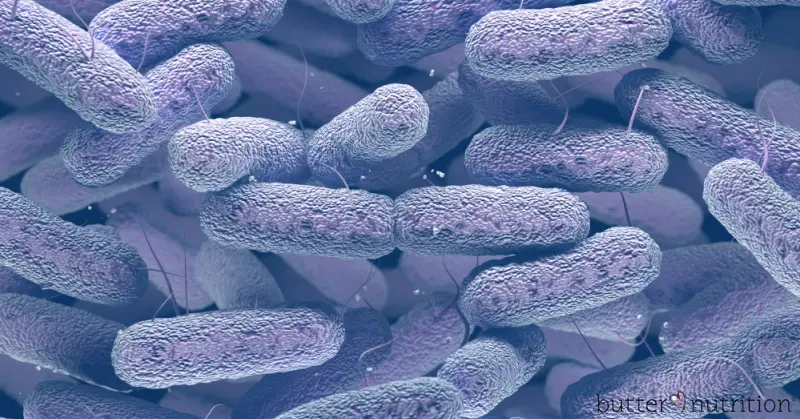
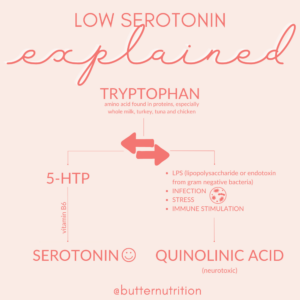
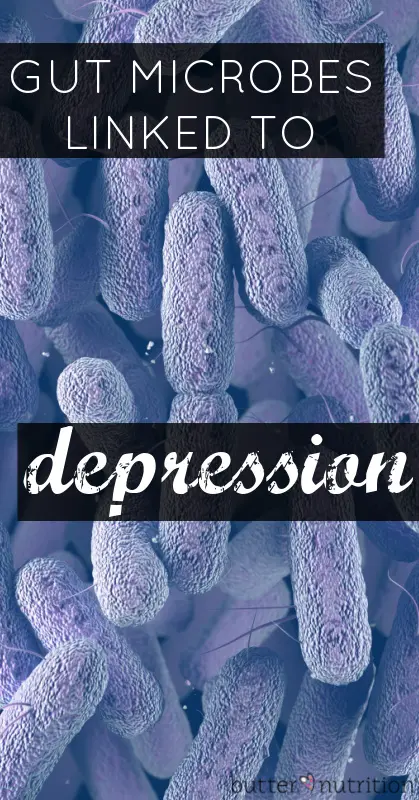
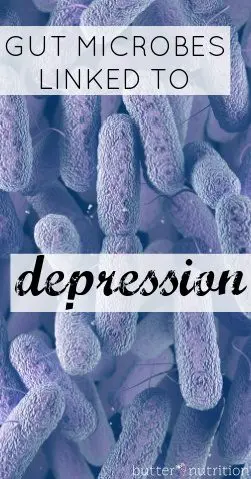

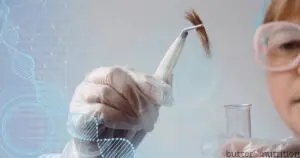
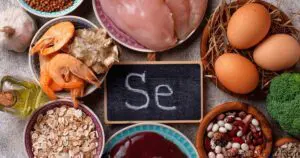

Kari
Excellent and timely post, thank you! Does the GI MAP test for candida? Thanks, Catherine.
Kari
Catherine
Hi Kari,
Yes, you can find a sample test here: https://butternutrition.com/wp-content/uploads/2020/10/GI-MAP-Sample-Report.pdf
Abundantly,
Catherine